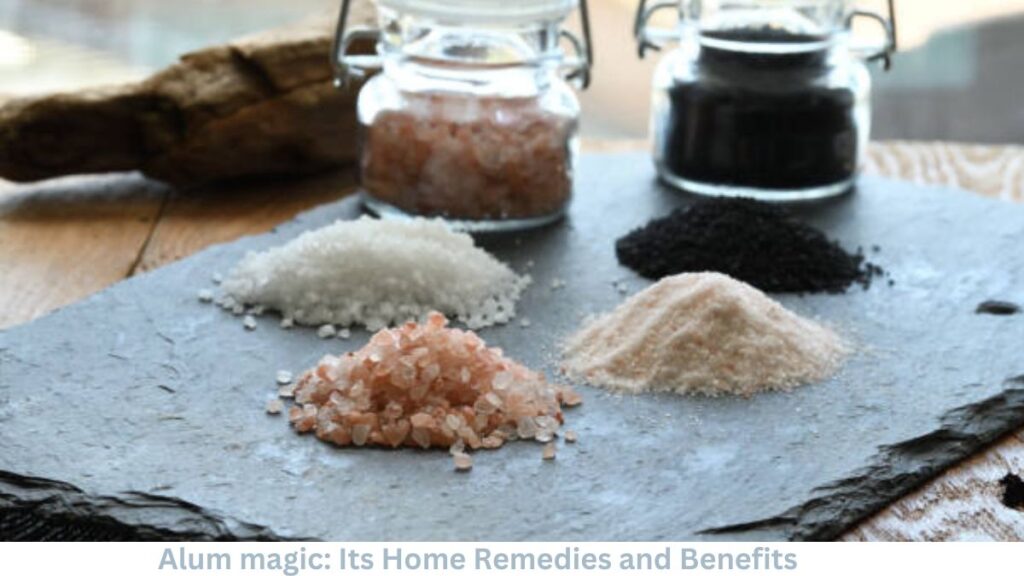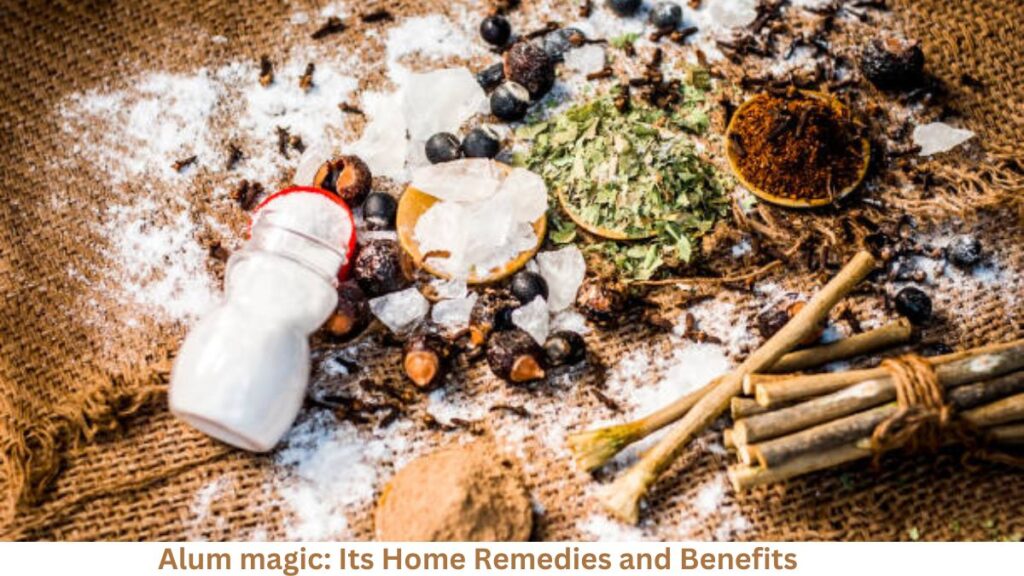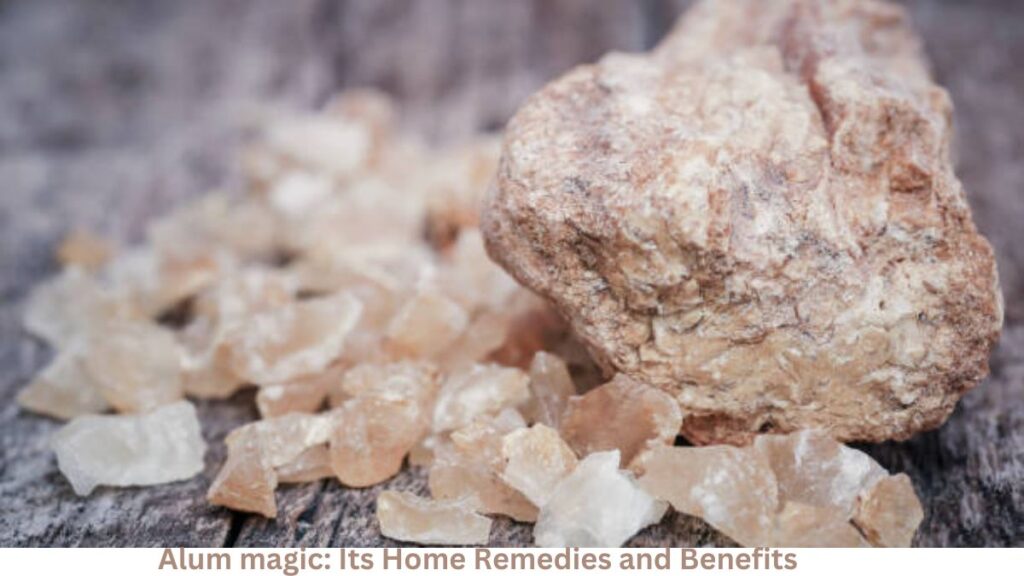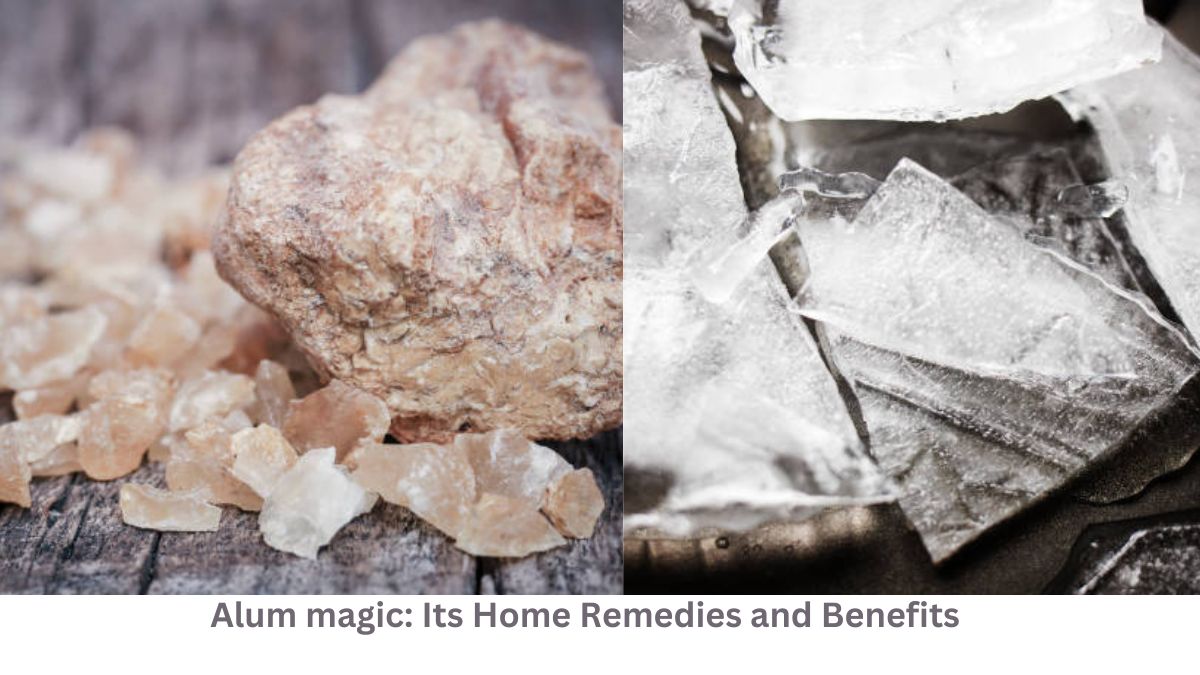Introduction:
Unveiling the Alum Magic : Your Ultimate Guide to Its Home Remedies and Benefits

In the realm of home remedies and natural solutions, there exists an unsung hero with remarkable capabilities: alum. Often overlooked amidst trendy remedies, alum possesses a plethora of benefits for various household applications. In this comprehensive guide, we’ll delve into the magic of alum, exploring its lesser-known yet powerful uses for enhancing your home and well-being.
Understanding Alum: Alum, scientifically known as potassium aluminum sulfate, has been utilized for centuries for its astringent, antiseptic, and purification properties. Traditionally sourced from naturally occurring minerals, alum is revered for its versatility and efficacy in addressing various household concerns.
Alum magic: Its Home Remedies and Benefits
- Alum as a Natural Deodorant: Alum’s astringent properties make it an effective natural deodorant. When applied to clean skin, alum forms a thin layer that inhibits bacterial growth, thus neutralizing body odor without the use of harsh chemicals.
- Alum for Oral Health: In oral care, alum can be used to alleviate mouth ulcers and gum inflammation. Its antiseptic properties help to reduce bacteria and soothe oral discomfort when used as a mouthwash or applied topically.
- Alum for Skin Care: Alum’s astringent and antiseptic qualities make it beneficial for treating minor cuts, burns, and insect bites. When diluted with water and applied to the affected area, alum promotes healing and helps prevent infection.
- Alum for Water Purification: Historically, alum has been employed as a water purifier due to its ability to clarify and remove impurities. By causing particles to clump together and settle at the bottom, alum facilitates the filtration process, resulting in cleaner and safer drinking water.
Maximizing Alum’s Benefits in the Home:
- Alum in Cooking: Beyond its medicinal uses, alum can also be found in culinary applications. In pickling, alum is utilized to maintain the crispness of fruits and vegetables, ensuring they retain their texture and flavor over time.
- Alum for Household Cleaning: When dissolved in water, alum can serve as a natural cleaning agent for surfaces such as aluminum cookware and glassware. Its abrasive properties help to remove stubborn stains and grime without the need for harsh chemicals.
- Alum in Gardening: In gardening, alum can be used to adjust soil pH levels and enhance plant growth. By incorporating alum into the soil, gardeners can promote healthier root development and improve overall plant vitality.
Is alum safe for everyone to use in home remedies?
While alum has many beneficial uses in home remedies, it’s essential to use it cautiously and be aware of potential risks, especially for certain individuals. Here’s a breakdown of safety considerations:

- Skin Sensitivity: Some individuals may experience skin irritation or allergic reactions when alum comes into contact with their skin. It’s advisable to perform a patch test before using alum topically, especially on sensitive areas like the face or mucous membranes.
- Oral Use: When used orally, alum should be used sparingly and with caution. Ingesting large amounts of alum can potentially lead to gastrointestinal irritation or even toxicity. It’s crucial to follow recommended dosage guidelines and consult with a healthcare professional before using alum internally.
- Pre-existing Conditions: Individuals with certain pre-existing conditions, such as kidney problems or urinary tract issues, should exercise caution when using alum. Alum can increase the excretion of certain substances through the urine, potentially exacerbating these conditions.
- Pregnancy and Breastfeeding: Pregnant or breastfeeding individuals should consult with a healthcare provider before using alum, as its safety during these periods is not well-established. It’s essential to err on the side of caution and avoid unnecessary risks.
- Children: Alum should be kept out of reach of children, as ingestion or excessive exposure can be harmful. Parents should supervise the use of alum in home remedies and ensure that it is used safely and appropriately.
- Allergic Reactions: Individuals with a known allergy to aluminum should avoid using alum, as it contains aluminum compounds that may trigger allergic reactions.
In summary, while alum can be safely used in home remedies for many individuals, it’s crucial to be aware of potential risks and use it judiciously. Consulting with a healthcare professional before using alum, especially internally or on sensitive areas, can help ensure its safe and effective use. Additionally, practicing proper storage and handling of alum can help prevent accidental exposure and minimize risks.
Does this guide discuss alternative remedies that might be suitable for those who can’t use alum?
The guide doesn’t explicitly mention alternative remedies for those who can’t use alum. However, it’s essential to recognize that there are often alternative solutions available for various home remedy applications. Here are a few examples of alternative remedies that might be suitable for individuals who can’t use alum:
- Skin Irritations: Instead of using alum for skin irritations or minor cuts, individuals can opt for alternative natural remedies such as aloe vera gel, coconut oil, or calendula cream. These alternatives have soothing and healing properties and are less likely to cause irritation or allergic reactions in sensitive individuals.
- Oral Health: For individuals unable to use alum for oral health purposes, alternatives such as saltwater rinses, herbal mouthwashes (e.g., sage or chamomile), or commercially available oral care products may be suitable. These alternatives can help maintain oral hygiene and alleviate mouth ulcers or gum inflammation without the potential risks associated with alum.
- Household Cleaning: Instead of using alum as a cleaning agent, individuals can opt for eco-friendly cleaning products or homemade cleaners using ingredients like vinegar, baking soda, or lemon juice. These alternatives are effective for removing stains and grime without the potential risks posed by abrasive substances like alum.
- Water Purification: Alternative methods for purifying water include boiling, filtration systems, or commercially available water purification tablets. These methods can effectively remove impurities and ensure safe drinking water without the need for alum.
While alum may offer benefits for various home remedy applications, it’s essential to consider alternative remedies for individuals who may be unable to use alum due to sensitivity, allergies, or other concerns. Consulting with a healthcare professional or researching alternative remedies can help individuals find suitable solutions for their specific needs and preferences.
Is alum really a magical cure-all, or are there limitations to its benefits?
While alum does offer numerous benefits and has a wide range of applications in home remedies, it’s important to recognize that it is not a magical cure-all, and there are limitations to its benefits. Here are some considerations to keep in mind:

- Specific Applications: Alum is particularly effective for certain uses, such as a natural deodorant, astringent for skin conditions, or as a clarifying agent in water purification. However, its benefits may not extend to all health or household concerns, and there may be more suitable remedies or treatments available for certain conditions.
- Safety Concerns: While alum is generally safe for topical use and in small doses, excessive or prolonged exposure can lead to irritation or adverse effects, especially for individuals with sensitive skin or certain health conditions. It’s important to use alum judiciously and to follow recommended guidelines to minimize the risk of side effects.
- Alternative Solutions: For some health or household concerns, there may be alternative remedies or treatments that are equally effective or more suitable for individual preferences or needs. It’s essential to explore different options and consult with healthcare professionals or experts to determine the most appropriate solution for specific situations.
- Limited Scientific Evidence: While alum has been used for centuries in traditional medicine and home remedies, the scientific evidence supporting its efficacy for certain uses may be limited or inconclusive. More research is needed to fully understand the mechanisms of action and potential benefits of alum in various applications.
- Individual Variability: The effectiveness of alum and its suitability for specific individuals may vary based on factors such as skin type, sensitivity, underlying health conditions, and personal preferences. What works well for one person may not necessarily work for another, and it’s important to consider individual differences when using alum or any other remedy.
In summary, while alum does offer numerous benefits and has been valued for its versatile applications in home remedies, it is not a magical cure-all, and there are limitations to its benefits. It’s essential to use alum responsibly, to consider alternative solutions when appropriate, and to consult with healthcare professionals or experts for personalized advice and guidance.
Conclusion:
In conclusion, alum stands as a testament to the enduring power of natural remedies in the modern world. From its medicinal properties to its utility in cooking and cleaning, alum continues to prove its worth as a versatile and effective solution for various household needs. By incorporating alum into your daily routine, you can unlock its magic and reap the countless benefits it offers for a healthier, happier home.






